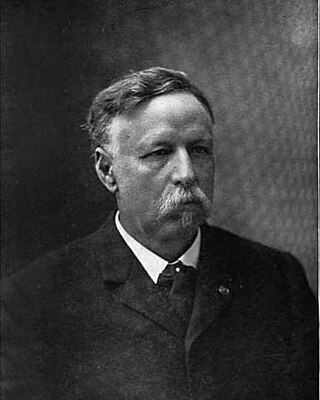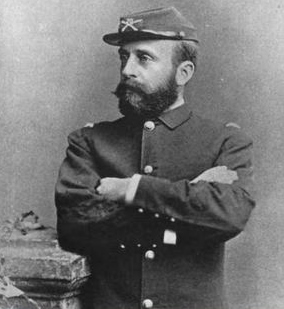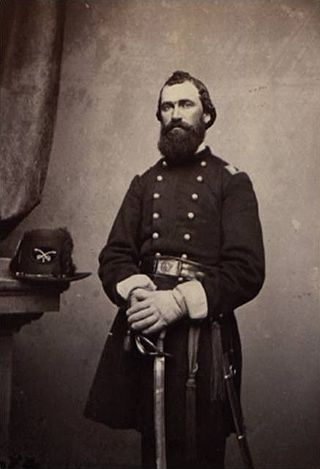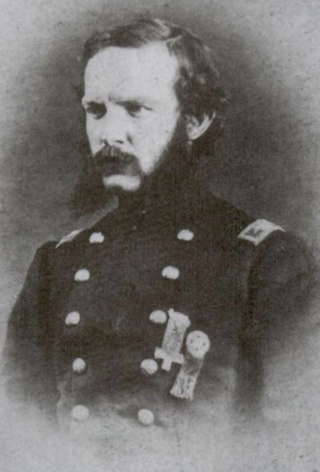
The 20th Maine Infantry Regiment was a volunteer regiment of the United States Army during the American Civil War (1861–1865),most famous for its defense of Little Round Top at the Battle of Gettysburg in Gettysburg,Pennsylvania,July 1–3,1863. The 133rd Engineer Battalion of the Maine Army National Guard and the United States Army today carries on the lineage and traditions of the 20th Maine.

Theophilus Francis Rodenbough was born in Easton,Pennsylvania and was a Union Army officer during the American Civil War. He received America's highest military decoration the Medal of Honor for his actions at the Battle of Trevilian Station. After his retirement from the U.S. Army in 1870,he wrote several books about military history.

John Irvin Gregg was a career U.S. Army officer. He fought in the Mexican–American War and during the American Civil War as a colonel and near the end of the war as a brevet general in the Union army. In 1866,he was nominated and confirmed as a brevet major general of volunteers and a brevet brigadier general in the Regular Army,both to rank from March 13,1865.
The 26th Wisconsin Infantry Regiment was a volunteer infantry regiment that served in the Union Army during the American Civil War. The regiment had a total enrollment of 1,089 men during its service,of which 191,(17.5%) were killed in action or mortally wounded,the fourth-highest percentage of any Union regiment. Almost 90% of its members were of German heritage.

John Peter Shindel Gobin was an American politician from Pennsylvania who served as an officer in the Union Army during the Civil War,as a member of the Pennsylvania State Senate for the 17th district from 1885 to 1898 and as the seventh lieutenant governor of Pennsylvania.

The 105th Pennsylvania Volunteer Infantry was an infantry regiment which served in the Union Army during the American Civil War. Among the regiment's early recruits was future United States Congressman Albert C. Thompson.

Easton Cemetery is a historic rural cemetery located in Easton,Pennsylvania and the burial site of many notable individuals.
Patrick Robert Guiney was an American Civil War soldier.

Sylvester Bonnaffon Jr. was a United States soldier who fought with the Union Army during the American Civil War as a first lieutenant with Company G of the 99th Pennsylvania Infantry. He received his nation's highest award for valor,the U.S. Medal of Honor,for his gallantry and leadership against Confederate troops during the Battle of Boydton Plank Road,Virginia on October 27,1864. That award was conferred on September 29,1893.

William Stowell Tilton was an American businessman and soldier who led a regiment,and occasionally a brigade,in the Army of the Potomac during the American Civil War. He and his men were heavily engaged in the Battle of Gettysburg,where Tilton's performance created controversy.

Jacob Gellert Frick Sr. was a United States infantry officer who fought with several Union Army regiments during the American Civil War,including as lieutenant colonel of the 96th Pennsylvania Infantry and as colonel of the 129th Pennsylvania Infantry. He received his nation's highest award for valor,the U.S. Medal of Honor,for his gallantry during the battles of Fredericksburg and Chancellorsville,Virginia. Grabbing the American flag from his regiment's color-bearer at Fredericksburg on December 13,1862,he inspired his men to move forward "through a terrible fire of cannon and musketry";at Chancellorsville,he personally engaged in hand-to-hand combat on May 3,1863,to retrieve his regiment's flag which had been captured by the enemy. He was 67 years old when his Medal of Honor was conferred on June 7,1892.
George Zinn was a Union Army officer during the American Civil War. President Andrew Johnson nominated him on January 13,1866 for appointment to the grade of brevet brigadier general of volunteers,to rank from April 6,1865,and the United States Senate confirmed the appointment on March 12,1866.

Jacob C. Higgins (1826–1893) was a commander of Pennsylvania troops who participated in both major military conflicts of his time,the Mexican–American War and the American Civil War. Among his Civil War commands,he guided the 125th Pennsylvania Infantry regiment under heavy fire during the Battle of Antietam and likewise during the Battle of Chancellorsville. Following the muster out and return home of the 125th PA,the Gettysburg Campaign sent cavalry under Confederate General John D. Imboden to threaten vital railroad resources at Altoona and iron production facilities in the Juniata River watershed;in response,Emergency Militia was organized by Colonel Higgins and minimized this northwestern incursion.

The 47th Pennsylvania Infantry Regiment,officially the 47th Regiment,Pennsylvania Volunteer Infantry and sometimes referred to simply as the 47th Pennsylvania Volunteers,was an infantry regiment that served in the Union Army during the American Civil War and the early months of the Reconstruction era. It was formed by adults and teenagers from small towns and larger metropolitan areas in central,northeastern,and southeastern regions of Pennsylvania.

The 1st Pennsylvania Infantry was an infantry regiment in the Union Army during the American Civil War that served for three months at the beginning of the war.

Alexander H. Mitchell was a United States military officer who fought with the Union Army during the American Civil War as captain of Company A of the 105th Pennsylvania Infantry. Wounded multiple times in combat during the war,he was awarded the Kearny Cross for his distinguished service in the Battle of Chancellorsville,Virginia in May 1863,and was then also awarded his nation’s highest award for valor,the U.S. Medal of Honor for his capture of a Confederate flag in hand-to-hand combat with the color-bearer of the 18th North Carolina Infantry during the Battle of Spotsylvania Court House on May 12,1864.

James George Mitchell was a Pennsylvania state senator and United States soldier who fought with the Union Army during the American Civil War as a drummer boy and private with Company A of the 105th Pennsylvania Infantry. He served under his older brother,Alexander H. Mitchell (1840–1913),who was later awarded the U.S. Medal of Honor for valor.
Joseph Hill Sinex was an American politician from Pennsylvania who served as a member of the Philadelphia City Council in 1861 and as a Republican member of the Pennsylvania House of Representatives for Philadelphia County from 1883 to 1884.

George Fairlamb Smith was an American soldier,politician,and lawyer from West Chester,Pennsylvania. He was wounded twice and captured during the American Civil War,ending the war with the rank of colonel in command of the 61st Pennsylvania Infantry Regiment in the Union Army. He went on to serve in the Pennsylvania House of Representatives in 1875–76 and as judge advocate general of the Pennsylvania National Guard in 1877.

William Beidelman (1840-1903) was an American politician from the Lehigh Valley region of eastern Pennsylvania. He served in the Union Army during the American Civil War and saw combat at the Battle of Gettysburg,which was the war's turning point in the Union's favor but also its bloodiest battle.

















